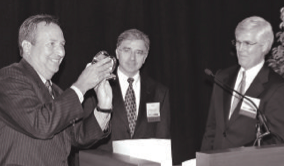 If the United States is going to maintain a leadership position in stem cell research, there has to be more emphasis on teaching modern science in schools and less political concern “about what ‘kind’ of science to teach,” Debora L. Spar, PhD, Senior Associate Dean of Harvard Business School, told those attending the first annual Stem Cell Leadership Summit.
If the United States is going to maintain a leadership position in stem cell research, there has to be more emphasis on teaching modern science in schools and less political concern “about what ‘kind’ of science to teach,” Debora L. Spar, PhD, Senior Associate Dean of Harvard Business School, told those attending the first annual Stem Cell Leadership Summit.
Spar, whose role was to sum up the day’s program, was echoing a theme stated by many of the speakers—finding ways to make sure the country’s best young scientists are not discouraged from going into stem cell science by the political environment and lack of funding.
The daylong event brought together nearly 200 stem cell scientists, ethicists, venture capitalists, biotech leaders, and other supporters of stem cell research for a series of talks and discussions focused on how to support stem cell science and ensure that it fulfills its promise to cure diseases, move the U.S. economy forward, and secure opportunities for innovation. The summit was co-sponsored by HSCI, the Massachusetts General Hospital Center for Regenerative Medicine (CRM), and the CRM’s Innovation Fund.
Keynote speaker Lawrence H. Summers, PhD, Charles W. Eliot University Professor, told the gathering that the most important thing the leaders of HSCI have done in the past two years is “empower the brilliant young investigators who are going to see the future” by providing them with funding and other forms of support.
Summers and other speakers noted that supporting the next generation of scientists is vital to success in stem cell science and other areas of biomedical research. While Harvard and Boston are presently in an unparalleled position of strength in the life sciences and medical research, it is vitally important that “we not confuse a moment of leadership with enduring competitive strength,” Summers warned.
During one of the day’s plenary sessions, Joseph Fuller, MBA, a founder of the Monitor Group, pointed out that if Boston and the United States are going to remain dominant in stem cell research in the face of competition from abroad, private individuals, venture capital, and state governments are going to have to fill the funding gap until the federal government begins to finance the research.
William A. Sahlman, MBA, PhD, Professor of Business Administration at Harvard Business School, struck a familiar chord when he predicted that young scientists are not going to embark on careers where they’re not sure of getting funding or tenure. “If the best and brightest of the next generation of scientists turn away from stem cell research,” said Sahlman, “we could be describing a disaster of unparalleled proportion.”
